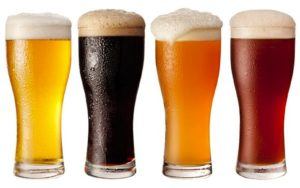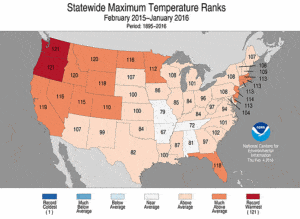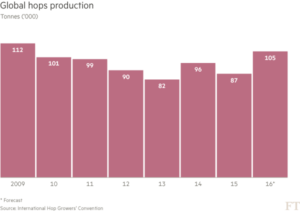Anheuser-Busch Says No to Bad Beer: The Impact of Climate Change on the Beer Industry
An article on the effects of global warming on the beer industry

Imagine that it is the 4th of July holiday and you are celebrating at a barbeque with family and friends. You open a crisp bottle of Shock Top, your favorite Anheuser-Busch beer, and you search for a sliced orange to add an extra special touch to your beverage. Once you taste the Shock Top, you notice that it tastes much different than usual. In fact, the orange, lime and coriander aromas and flavors were replaced with a strikingly harsh and bitter taste. How could this be? One answer: Global Warming.
The Impact:
Climate change’s impact on water sources has had a detrimental effect on the production of one of the key ingredients in beer: hops. Hops are the flower buds of the hop plant which are added to beer to provide flavoring and aromas to the finished product. Within the United States, 73% of the nation’s hops are produced in the state of Washington, primarily in the Yakima Valley. In the Yakima water basin, rising global temperatures are expected to increase the frequency of water shortages. Historically, 14% of years between the period of 1940-2005 were impacted by droughts. By 2080, 43-68% of years are expected to be impacted by droughts (2).
According to the National Oceanic and Atmospheric Administration map shown above, the state of Washington recorded its warmest temperature of 121 degrees Fahrenheit during the period of February 2015 – January 2016 (3). As a result, year-end 2015 hop yields in Washington were down -4.5% y-o-y and hop yields were down -3.3% in the total Pacific Northwest (4). 2016 however is forecasted to be a 7 year high for hops yields, largely driven by abundant rains and favorable temperatures in key growing areas (5). As shown in the chart below, The International Hop Growers Convention forecasts global hops production to increase to 105,442 tonnes by 2016, from a low of 87,000 tonnes in 2015.
As expected, fluctuations in the supply of hops impacts the demand of hops and ultimately the price. Since the last USDA National Hop report in 2012, contract hop prices have doubled and in some cases even tripled. Therefore, it is no surprise that companies such as Anheuser-Busch, one of the world’s largest brewing companies, are motivated to employ environmental standards that help mitigate the severe effects of climate change on the environment and the beer industry as a whole (6).

What has Anheuser-Busch done to mitigate the effects of climate control?
Anheuser-Busch has 7 environmental goals that it aims to achieve by 2017 (two of which have already been met in 2014). These goals are largely linked to a reduction in water risks and improved water management in key barley growing regions, reduction in energy usage, and a reduction in packaging materials and greenhouse gas emissions (7).
Anheuser-Busch has launched a number of initiatives including the Shock The Drought campaign which raised funds to identify and fund breakthrough water-saving innovations that can be deployed in the near-term. Furthermore, a growing number of the company’s brewers donate run-off water to local communities where otherwise fresh water would be used. The Company has also launched several green logistics initiatives to reduce energy usage and emissions in the supply and logistics process, including the use of river barges to transport bottles instead of trucks and the use of biodiesel trucks versus traditional fuel (7).
What more can be done?
While Anheuser-Busch has taken necessary strides to mitigate the effects of climate change, my view is that much more can be done. For example, the company can focus on the following 3 specific initiatives:
- Anheuser-Busch can partner with academics and sustainable breweries such as Full Sail Brewing Co. in order to research and employ technologies (such as Meura mash filters) that reduce water usage. Full Sail Brewing Co. has implemented a technology that uses 3 gallons of water to brew beer versus 10 gallons that a typical brewery uses.
- Anheuser-Busch can consider housing its own nitrogen fuel cells at breweries, such as those at Sierra Nevada (the only brewery in the country to employ this technology to supply ~90% of their energy)
- Anheuser-Busch can adopt eco-labels which publicly display the brewers impacts on the environment in the production of the beer. This would be similar to a nutrition label and would place accountability on the breweries to maintain their environmental standards.
These initiatives will certainly require significant capital investments to be completed; however, my view is that return on investment is high and these capital expenditures are necessary to help alleviate the severe issues caused by climate change. (776 words)
Sources:
(1) Vano, J. A., Scott, M. J., Voisin, N., Stöckle, C.,O., Hamlet, A. F., Mickelson, K. E., . . . Lettenmaier, D. P. (2010). Climate change impacts on water management and irrigated agriculture in the yakima river basin, washington, USA.Climatic Change, 102(1-2), 287-317. doi:http://dx.doi.org.ezp-prod1.hul.harvard.edu/10.1007/s10584-010-9856-z
(2) Snover, A.K, G.S. Mauger, L.C. Whitely Binder, M. Krosby, and I. Tohver. 2013. Climate Change Impacts and Adaptation in Washington State: Technical Summaries for Decision Makers. State of Knowledge Report prepared for the Washington State Department of Ecology. Climate Impacts Group, University of Washington, Seattle.
(3) National Centers for Environmental Information, “National Temperature and Precipitation Maps,” http://www.ncdc.noaa.gov/temp-and-precip/usmaps/12/201601?products%5b%5d=statewidetmaxrank, accessed October 2016.
(4) USA Hops 2015 Statistical Report, “2015 Statistical Report,” https://www.usahops.org/img/blog_pdf/5.pdf, accessed October 2016.
(5) Financial Times, “Hops harvest forecast to set a 7-year high,” http://search.proquest.com.ezp-prod1.hul.harvard.edu/docview/1802072862?accountid=11311, accessed October 2016.
(6) CNBC, “Craft Beer Boom Has Brewers Scrambling For Hops,” http://www.cnbc.com/2014/07/16/hops-prices-inside-the-rising-cost-of-a-critical-beer-ingredient.html, accessed October 2016.
(7) Anheuser-Busch Inbev, 2015 Annual Report, p. 44.





Do you think consumers will value the eco-labels to the extent they would pay a premium price for that type of beer? It might help maximize profits to find the beer product that consumers would pay more for, if completely sourced with sustainable materials. Could they also do R&D for alternative packaging instead of just reduced packaging?
The concentration of the hops supply within the United States is really interesting. It was surprising to learn that sophisticated multi-national corporations like the mega brewers are so dependent on a crop with 73% of production in one area. I wonder what steps they have taken so far to help diversify this input supply base? Based on data from the Food and Agriculture Organization of the United Nations, it looks like the U.S. represents ~23% of global hops supply (with Germany at 23% and Ethiopia at 18%) [1] – I wonder how regional or international sourcing impacts the economics of their manufacturing operations and how their global supply chain (and international operators) have worked to diversify the supply of these climate sensitive inputs?
[1] As of 2013. http://faostat.fao.org/beta/en/?#data/QC, accessed Nov. 2016
I also wonder why majority of the nation’s hops are produced in Yakima Valley, Washington. Are there beer producers that have started to invest in other geographic areas conducive for growing hops, perhaps those in a cooler climate? I really like your idea of adopting an eco-label. While I agree with Anja A. that this pay not make a huge difference in consumers’ purchase decisions, but this can gain some positive publicity for the Company while putting pressure on its competitors. On the topic of accountability, is there also a way for the company to work with regulators on setting a specific environmental standards for breweries in US?
Awesome piece, Brittany! I did not think that the beer industry is affected by climate change. I found the part about the fluctuation in production of the hops to be particularly interesting and a shortage of hops can clearly affect the taste of the product (for the worse)!
I found your recommendations to be very insightful. I disagree with some of the posts here about the response from consumers about the eco-label. I think Anheuser-Busch has a great opportunity to differentiate itself from its competitors by including their sustainability efforts in their value proposition. As we learned in marketing, both Starbucks and S’well have built socially responsible brands and its branding has appealed to many of its customers. Anheuser-Busch should capitalize on this and be the environmentally friendly beer as a way to appeal to millennials.